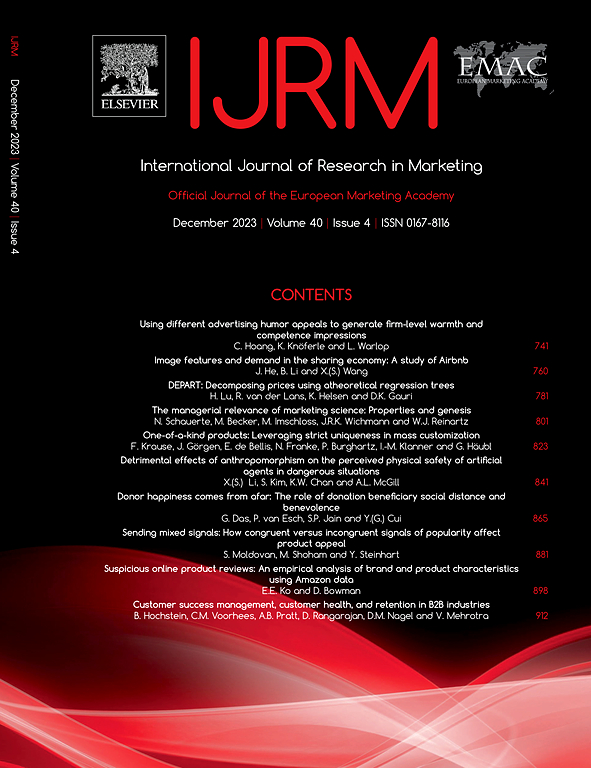企业社会责任效应的元分析:利益相关者类型和国家因素的作用
IF 7.5
2区 管理学
Q1 BUSINESS
International Journal of Research in Marketing
Pub Date : 2025-09-01
DOI:10.1016/j.ijresmar.2024.11.003
引用次数: 0
摘要
尽管研究表明,企业社会责任(CSR)可以产生积极的消费者反应,但企业,尤其是跨国公司,仍然面临着挑战,即如何有效地在不同国家定制企业社会责任活动,以取得有利的结果。为了解决这个问题,我们将基于利益相关者理论的企业社会责任活动分为核心型和扩展型。然后,我们引入了一个包含五个国家因素的元分析框架,以检查它们如何影响这些CSR类型的差异效应。我们使用了来自六大洲43个国家的202篇论文的940个效应大小的数据集,发现核心企业社会责任通常比扩展企业社会责任引起更积极的消费者反应,并且这种影响受到国家因素的调节。在将世俗理性价值观置于传统价值观之上、将生存价值观置于自我表达价值观之上的社会中,核心企业社会责任与延伸企业社会责任的积极差异效应更大。此外,这种积极的差异效应随着互联网普及率的提高而增加,但随着国民经济增长率和高等教育入学率的提高而降低。这些发现促进了对企业社会责任效应和类型的跨国差异的理解,为国际营销经理提供了有价值的见解。本文章由计算机程序翻译,如有差异,请以英文原文为准。
A meta-analysis of corporate social responsibility effects: The role of stakeholder type and country factors
Although research indicates that corporate social responsibility (CSR) can yield positive consumer responses, the challenge remains for companies, especially multinational ones, to effectively tailor CSR activities across different countries to achieve favorable outcomes. To address this, we classify CSR activities based on stakeholder theory into core and extended CSR types. We then introduce a meta-analytic framework that incorporates five country factors to examine how they affect the differential effects of these CSR types. Using a dataset comprising 940 effect sizes from 202 papers across 43 countries on six continents, we find that core CSR generally elicits more positive consumer responses than extended CSR, and that this effect is moderated by country factors. The positive differential effect of core over extended CSR is greater in societies that prioritize secular-rational values over traditional values, and survival values over self-expression values. Additionally, this positive differential effect increases with greater internet penetration but decreases with higher national economic growth rates and tertiary school enrollment. These findings advance the understanding of cross-country differences in CSR effects and types, offering valuable insights for international marketing managers.
求助全文
通过发布文献求助,成功后即可免费获取论文全文。
去求助
来源期刊
CiteScore
11.80
自引率
4.30%
发文量
77
审稿时长
66 days
期刊介绍:
The International Journal of Research in Marketing is an international, double-blind peer-reviewed journal for marketing academics and practitioners. Building on a great tradition of global marketing scholarship, IJRM aims to contribute substantially to the field of marketing research by providing a high-quality medium for the dissemination of new marketing knowledge and methods. Among IJRM targeted audience are marketing scholars, practitioners (e.g., marketing research and consulting professionals) and other interested groups and individuals.

 求助内容:
求助内容: 应助结果提醒方式:
应助结果提醒方式:


